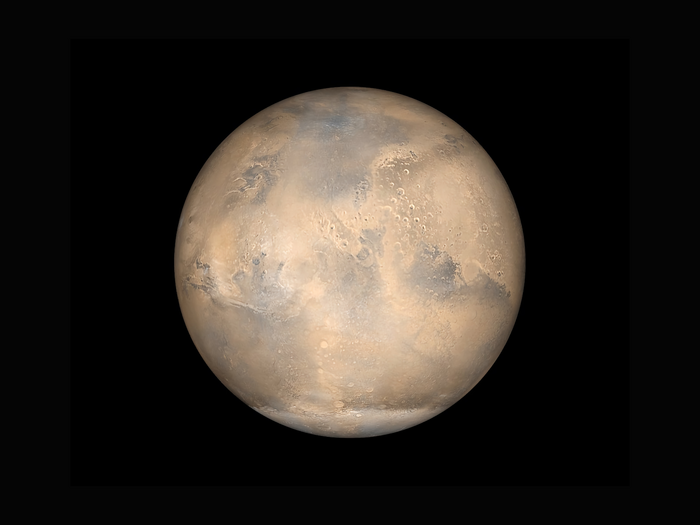Mars is called the red planet. But once, it was actually blue and covered in water, bringing us closer to finding out if Mars had ever harboured life.

Credit: NASA
Mars is called the red planet. But once, it was actually blue and covered in water, bringing us closer to finding out if Mars had ever harboured life.
Most researchers agree that there has been water on Mars, but just how much water is still debated.
Now a study from the University of Copenhagen shows that some 4.5 billion years ago, there was enough water for the entire planet to be covered in a 300-metre-deep ocean.
“At this time, Mars was bombarded with asteroids filled with ice. It happened in the first 100 million years of the planet’s evolution. Another interesting angle is that the asteroids also carried organic molecules that are biologically important for life,” says Professor Martin Bizzarro from the Centre for Star and Planet Formation.
In addition to water, the icy asteroids also brought biologically relevant molecules such as amino acids to the Red Planet. Amino acids are used when DNA and RNA form bases that contain everything a cell needs.
The study was published in the renowned journal Science Advances.
Mars may have had the conditions for life before Earth
The new study indicates that the oceans that covered the entire planet in water were at least 300 metres deep. They may have been up to one kilometre deep. In comparison, there is actually very little water on Earth, explains Martin Bizzarro.
“This happened within Mars’s first 100 million years. After this period, something catastrophic happened for potential life on Earth. It is believed that there was a gigantic collision between the Earth and another Mars-sized planet. It was an energetic collision that formed the Earth-Moon system and, as the same time, wiped out all potential life on Earth,” says Martin Bizzarro.
Therefore, the researchers have really strong evidence that conditions allowing the emergence of life were present on Mars long before Earth.
Billion-year-old meteorite
It was by means of a meteorite that is billions of years old that the researchers have been able to look into Mars’s past history. The meteorite was once part of Mars’s original crust and offers a unique insight into what happened at the time when the solar system was formed.
The whole secret is hiding in the way Mars’s surface has been created – and of which the meteorite was once a part – because it is a surface that does not move. On Earth it is opposite. The tectonic plates are in perpetual motion and recycled in the planet’s interior.
“Plate tectonics on Earth erased all evidence of what happened in the first 500 million years of our planet’s history. The plates constantly move and are recycled back and destroyed into the interior of our planet. In contrast, Mars does not have plate tectonics such that planet’s surface preserves a record of the earliest history of the planet,” explains Martin Bizzarro.
Journal
Science Advances
DOI
10.1126/sciadv.abp8415
Method of Research
Computational simulation/modeling
Subject of Research
Not applicable
Article Title
Late delivery of exotic chromium to the crust of Mars by water-rich carbonaceous asteroids
Article Publication Date
16-Nov-2022




